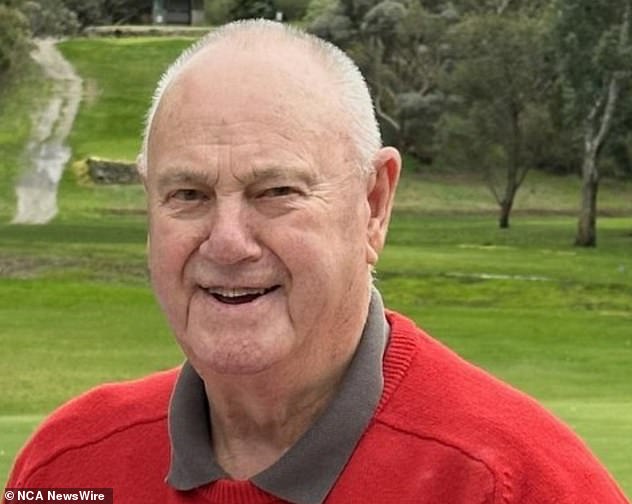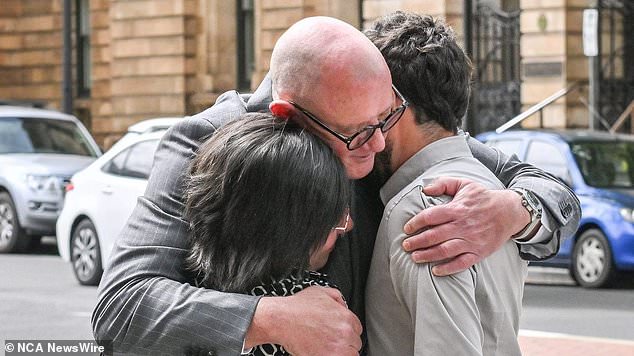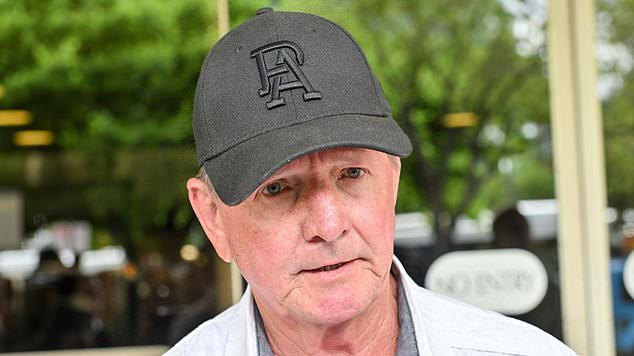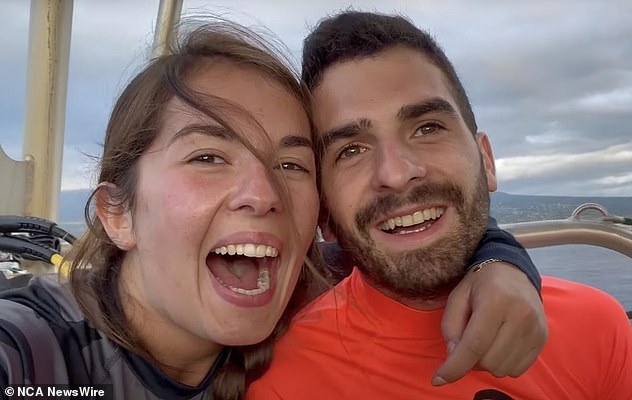The devastated wife of an Italian travel blogger responsible for the deaths of three people in a tragic accident has broken her silence.
Elena Perrone, speaking outside the Adelaide District Court on Friday, cried as she stood next to her husband Gabriele Cairo.
“We’re grateful this is over,” he said.
“We thank the family, we thank everyone and we are happy to be able to go.”
Cairo was behind the wheel of a caravan when it collided with the Clark family at a remote intersection in Everard Central, in South Australia’s mid-north region, on October 31, 2023.
Daughter Jacqueline, 54, who was driving a Honda Civic, died instantly, while mother Cynthia, 84, died at the scene and father John, 86, died days later in hospital.
Perrone also suffered critical injuries in the crash, including a collapsed lung and rib fractures, and spent five days in the intensive care unit at the Royal Adelaide Hospital.
Cairo failed to yield at the intersection and pleaded guilty to three counts of causing death by dangerous driving and one count of causing serious harm.
The Clark family has said they have forgiven Cairo for his devastating lack of care.
“I told them what I had to say,” Perrone said, his voice breaking.
‘We talked, and they understood us and forgave us.’
Cairo, who does not speak English, whispered something to his wife, and she told him she wanted to convey the same feelings to him.
Judge Paul Muscat handed Cairo a prison sentence of three years and six months but suspended the sentence, meaning the couple walked free from court and will immediately return to Italy.
Cairo and Perrone cried as Judge Muscat read their sentence and the tragic circumstances of the accident.
“It is clear that you are a man of exceptional quality and character,” Judge Muscat said.
“His decency as a human being cannot be questioned.”
Perrone and Cairo (pictured) traveled the world together, sometimes documenting their adventures on YouTube.
Cairo and Perrone were traveling together through Australia on their honeymoon and had to return to Italy a few days before the accident.
GPS data collected from Cairo’s phone showed he was traveling below the speed limit before the crash, which occurred around 5:30 p.m., and entered the intersection at 82 km/h.
A witness to the crash said the Clarks’ Honda Civic went “about three feet” into the air and spun after the collision.
The witness looked inside the car and saw the terrible carnage.
“I remember there was blood everywhere,” he said.
“He (Cairo) saw what had happened and collapsed in anguish.”
Judge Muscat said Cairo was now a “devastated” young man and had received counseling for post-traumatic stress disorder in the year since the accident.
A suspended sentence for a crime that results in multiple deaths is rare, but Judge Muscat, explaining his decision, said the punishment should not exceed “moral culpability.”
“Reaching a ruling in a particular case involves a balancing act between all the relevant issues and the exercise of judgment,” he said.

John Clark (pictured) was one of three members of the Clark family who lost their lives.
‘Sometimes the criminal who commits the crime is a person who has never committed any previous crime in his life, like you.
“Otherwise, they have good character and reputation in the community.” They have never intended to kill or cause injury to others by their dangerous driving, which is an important distinction from other serious criminal offenses, where the offender’s intent, or state of mind, is a critical component of the crime charge and , therefore, of his moral guilt.
‘There will be cases where a driver deliberately drives dangerously, such as driving aggressively, recklessly or at excessive speed… or driving dangerously under the influence of drugs or alcohol, or deliberately deciding to run a red light. , or interacting with your phone… clearly compromising, in all these scenarios, the safety of another person.
‘These criminals are usually imprisoned, for obvious reasons. But this is not one of those cases.
Judge Muscat said Cairo’s error lay in failing to maintain adequate vigilance and responding to the intersection of Templeton Rd and Blyth Rd or the yield sign in front of it.
In a letter to the Clark family, Cairo said he wished he could “go back in time and do things differently” to avoid the collision, but acknowledged that “life doesn’t work like that.”
“And then he did all he could, which was to accept responsibility and apologize for the tragic outcome that he has caused,” Judge Muscat said.
‘You feel pain every day… it’s fair to say you are a broken young man going through a very difficult time.
“You have found it difficult to forgive yourself, even though the family of those murdered have forgiven you.”

Perrone and Cairo hug their lawyer Michael Woods after Friday’s sentencing
The yield sign was placed in the last 200 meters before the intersection, the court was told, and if the warning sign was omitted, all that warned the driver that they were approaching the intersection was a single yield sign. yield at the intersection itself.
Following the accident, the Department of Infrastructure conducted a review of the intersection and the road leading to it and installed new infrastructure, including additional signs spaced at intervals before the intersection.
“I accept that these improvements highlight the deficiencies of the original signage of the period, although this does not exempt you from liability for dangerous driving,” Judge Muscat said.
The court was told Cairo had no memory of the accident and could not explain why he did not give way.
Judge Muscat concluded that Cairo’s moral culpability was at the “lower end” of the crime.
“You did not deliberately drive in a dangerous manner and you certainly did not intend for any of this to happen,” he said.
‘You are a good person who was enjoying life with your wife by your side when this tragedy occurred.
“In your case, there is no need to consider personal deterrence as a sentencing consideration.”

Clark family friend John Reinke (pictured) speaks after the sentence. He said he wished Cairo and Perrone the best on their return to Italy.
John Reinke, a friend of the Clark family, applauded Judge Muscat’s decision and said he would pass it on to the Clark family.
“I think Judge Muscat has made the right decision,” he said in court on Friday.
“There’s no point in sending someone like him, Gabriele, to jail, there’s no rhyme or reasoning to that,” he said.
‘I wish you all the best on your return to Italy. And we all have to move on, that’s all we can do.”
Reinke said the Clarks were remembered in the community as “great people.”
“We will miss them very much,” he said.
Cairo and Perrone first arrived in Cairns and traveled 6,000 kilometers across the country, visiting Brisbane, Byron Bay, Sydney, Uluru, Canberra and Melbourne before driving to Adelaide along the Great Ocean Rd.
The couple, who occasionally documented their travels, also visited Paris, Hawaii, Las Vegas, Los Angeles and San Francisco.

